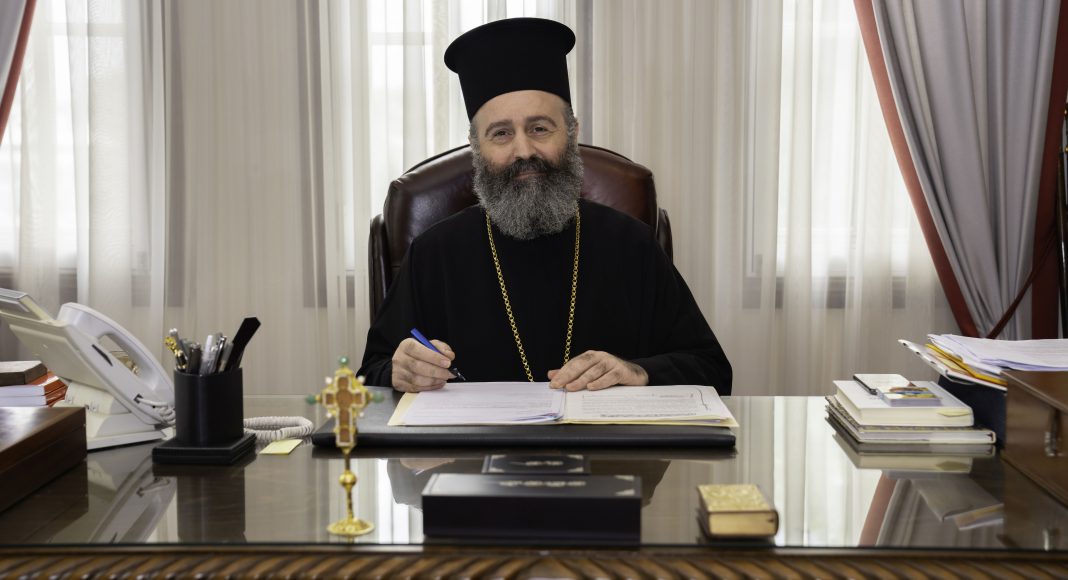In light of Greek Orthodox Easter, His Eminence Archbishop Makarios of Australia gave an interview to The Greek Herald explaining that while “everything we are experiencing this year is unprecedented and unpleasant, it is done to protect our society and the people close to us.”
Archbishop Makarios does not ignore the fact that the faithful are experiencing feelings of frustration as they are forced to abstain from the services of Holy Week due to the coronavirus pandemic. However, he points out that he is the first to go through this ordeal with grief, as he cannot communicate with his flock.
“It’s as if they have imprisoned a father and are not allowing him to see his family,” Archbishop Makarios says.
He also sends a message of optimism and hope to the faithful, stressing that this crisis will have an end date and explaining how this test can be the beginning of an effort to become better, more spiritual and holy. In addition, Archbishop Makarios also expresses his understanding of people who, during this difficult time, express concerns but reminds us of the message of the Resurrection of the Jesus Christ. Victory over death.
When asked if he is personally afraid these days, he answers categorically no and, among other things, emphasises: “I want to increase my love for Christ every day. Only that. And when you have that goal you are not afraid of illness, pandemics or even death. This love for Christ gives me strength and I move forward.”
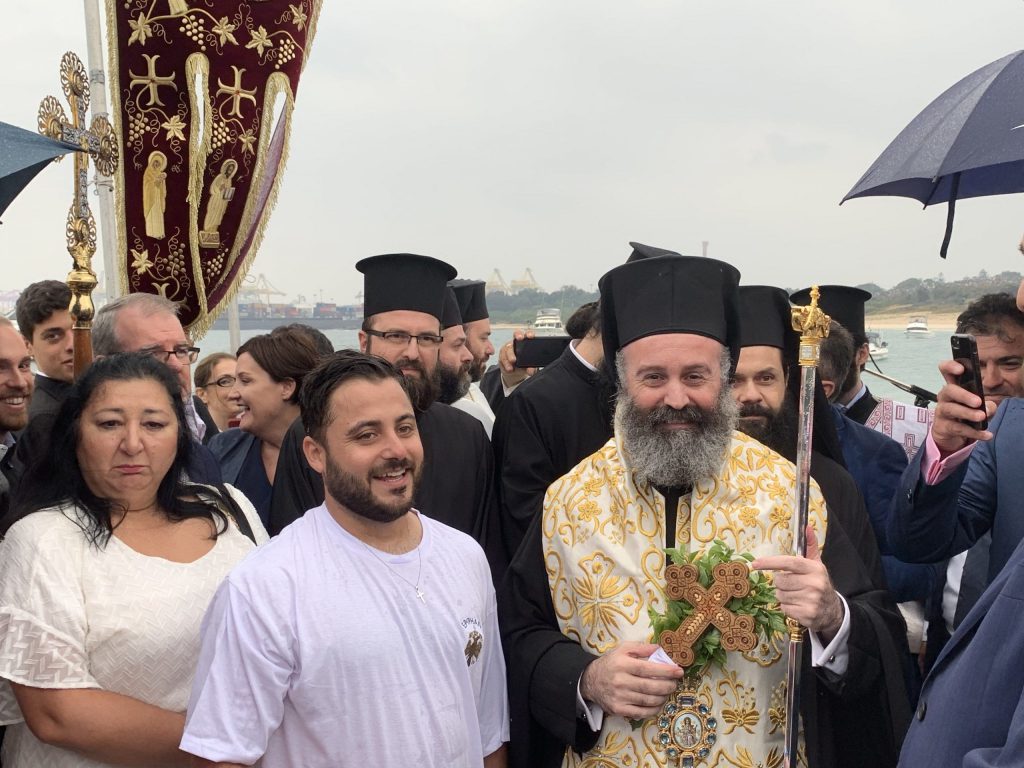
Commenting on the issue of Holy Communion and whether diseases can be transmitted through it, Archbishop Makarios also clarifies that no such case has been recorded in the historical course of the Orthodox Church. In support of this, he refers to an example of a priest who did not get leprosy after sharing communion with leper patients on the island of Spinalonga. In fact, he emphasises that he himself would not be hesitant to have Communion after people with diseases had communed, and explained that the restrictive measures applied to the churches are not related to Holy Communion but to the gathering of people and the dangers which can arise from these actions.
Showing his pride in the Orthodox community, Archbishop Makarios also refers to the initiatives taken by the Holy Archdiocese of Australia to support financially affected parishes and alleviate the plight of our fellow human beings who need increased care during this difficult period.
Finally, he does not fail to express his gratitude for the absolute trust and love he received from the Greeks of Australia from the moment he reached the country.
“I’ve been in Australia for a few months now and it’s like I’ve been there for years. I feel part of this body now and every day, I see God’s plan in my life,” he says.
1. Your Excellency, you have been at the Archdiocese of Australia for about a year now and have now been called to face something unprecedented. Mankind is threatened by a virus. Every day, thousands of people are dying on the planet. Can faith be a safe haven in these difficult times?
Indeed, in a short time I will have completed one year since my election and settlement here in the blessed country of Australia. I praise God for this great gift and blessing that he unexpectedly brought into my life and I am very happy because I was called to shepherd a very good people and a worthy clergy. Among the many blessings we have experienced together during this time, we have gone through two great trials. One was with the devastating fires and the other now, with the deadly coronavirus. The first gave us a great message: that the fires were extinguished because it started to rain suddenly from the sky during summer and in the end, what people failed to do, God did. In such great catastrophes, the weakness of modern man is ascertained. The second trial is still challenging us. We will wait to see what God wants from us through this pandemic, because I am sure that something good will come from it. I am certainly sorry for the sick and for those who could not withstand the greedy pandemic and lost their lives. May God rest them and give courage and strength to their loved ones.
The issue of faith is personal and sensitive. What I want to highlight, however, is that in the Orthodox Church we do not have faith that this is how we find the secret to overcoming our problems, our illnesses and our pandemics. In fact, I dare say that Christ did not promise any of His disciples, nor those who will follow Him – that is, all of us – prosperity, health, well-being and material goods. Instead, he warned us and told us: “If I am persecuted, I will be persecuted.” And at another point he told us: “In the world, you grieve.” Therefore, faith is not a cure for the sufferings of this world. Faith, however, is the basis for knowing Christ and following Him. Some resort to faith, believing that they can overcome their illness. I don’t know if that should be the case because faith in God is not about some form of deal. Faith helps us to understand and accept God’s silence when we are tormented by questions such as: why does God allow pain, pandemic, coronavirus, and death?
Faith, in other words, is the basis for increasing our daily love for Christ. When this is the question of our lives, we are somewhat liberated. We don’t care if we are healthy or sick. We don’t care if we die today or tomorrow. We do not glorify God for our healing or for our sickness. We glorify God because we have known Him by faith and are close to Him. We don’t care about everything else. They are not a priority for us.
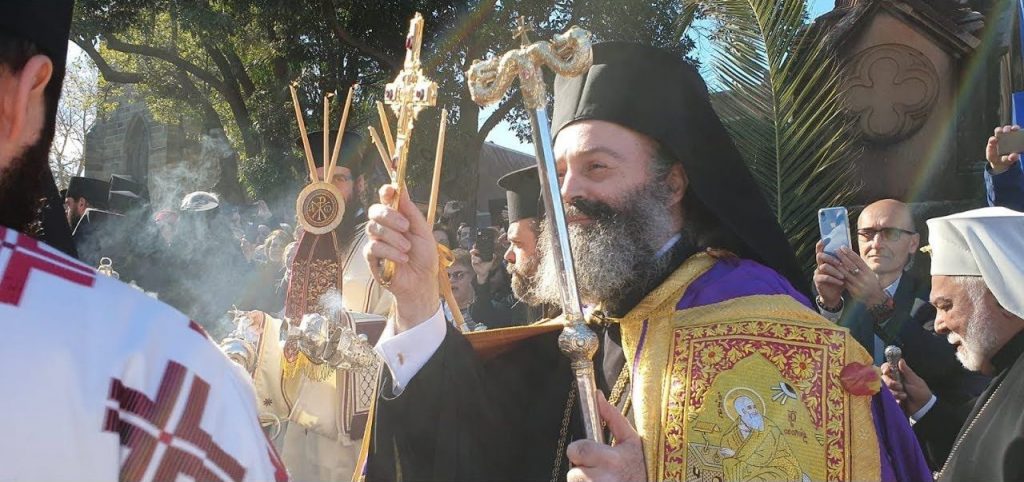
2. Globally, as in Australia, we have seen many people panicking. The fear of death has surrounded everyone. In a few days, however, Jesus Christ will teach us again to not be afraid, to do as he did. What does Easter signal in the middle of a pandemic?
Personally, I completely understand the reaction of the people. We have a pandemic that is threatening us every waking hour. We have all suffered many kinds of consequences from this pandemic. It is therefore normal for some of our fellow human beings to have thoughts, worries, phobias and panic attacks. However, the fear of death that has surrounded us, as you rightly asked in your question, is not related to the Orthodox Church. Our Church simply does not use a moral system of values to teach us to be good people. We can find this in all religions and philosophical teachings. Our Church also does not give us a list of virtues that we must obtain or actions that we must do to familiarise ourselves with Christ.
In the Orthodox Church, whoever loves knows Christ. And whoever loves is saved. Our Orthodox Church does not teach us how to be good or bad children, but it teaches us how to overcome death and all that precedes or follows death. That is, illness, wear and tear, stench, fear. Easter, which is essentially the commemoration of victory over death, gives that message exactly. I conquer death like Christ, which means I am free. I don’t care if I die today, tomorrow or yesterday. This freedom teaches us this Easter and every Easter. This fearlessness in the face of the mystery of death is the perspective that our Orthodox Church offers.
3. Many believers in Australia and Greece look forward to Holy Week. This year, in an unprecedented time, they will not be able to attend services. There is frustration. What can you tell them to ease this frustration?
Believe me, the first person to have great sorrow and grief is the Archbishop because the situation has led to me being unable to communicate with our clergy and our people. It’s as if they have imprisoned a father in prison and do not allow him to see his family. That’s how I feel and that hurts me a lot. I am sure that many people have similar feelings, who would also like to celebrate with me the great events of the Despotic Passion and the Resurrection. I am sure that this is how thousands of believers all over Australia feel because they cannot experience these days like every year. That is, in the temple, sharing senses, listening to the night hymns, the fragrance of the incense, the view of the Bridegroom, the Crucified Christ and the Epitaph, the reception of the Holy Light, the taste of Holy Communion. Everything we are experiencing this year is unprecedented and not pleasant.
All this is done to protect our society and the people close to us. As pointed out in a recent cyclical on coronavirus, we do not want our Churches to become a source of infection and transmission of the virus. We respect the presence of our neighbour, we listen to the guidance of the State and we comply with the instructions of science. I want to tell our people not to be sad and upset, even though I know I’m asking for something difficult. Fortunately, this situation does have an end date. No pandemic in human history lasted forever. The measures will pass and our Churches will open, and then we will all celebrate together. In the meantime, let’s try to get the best results while facing whatever is ahead of us. I mean let’s see what positives we can get out of this unpleasant situation. Let me give you an example.
The pandemic has confined us to the indoors. This allows us to implement an old habit that we have forgotten. Family prayer. In the old days, people would slowly return from their fields and work to their homes. They ate a piece of bread and then all together they prayed in front of the image of Christ. The father would say the “Heavenly King” prayer, the mother would say the prayer “I believe in one God,” the first child would say the “Lords Prayer,” and the little child, who did not know much, would say “Lord have mercy.” This image of the traditional family was lost by Hellenism and the Greek Diaspora.
Today we go on vacation as a family, we visit as a family, we go shopping as a family, we go to the restaurant as a family. But we do not do family prayer. We complain that today’s couples are easily separated and thus, families break up. I invite you to show me a couple that prays together as a family and I will guarantee that this couple will never separate. So you see, we have lost that blessed practice. Now with the coronavirus, we perhaps have an opportunity to bring this practice back to our homes. Here’s one positive thing that can happen. So, in this way, do not be disappointed but try to become better, more spiritual and more holy through the trials and difficulties of life.
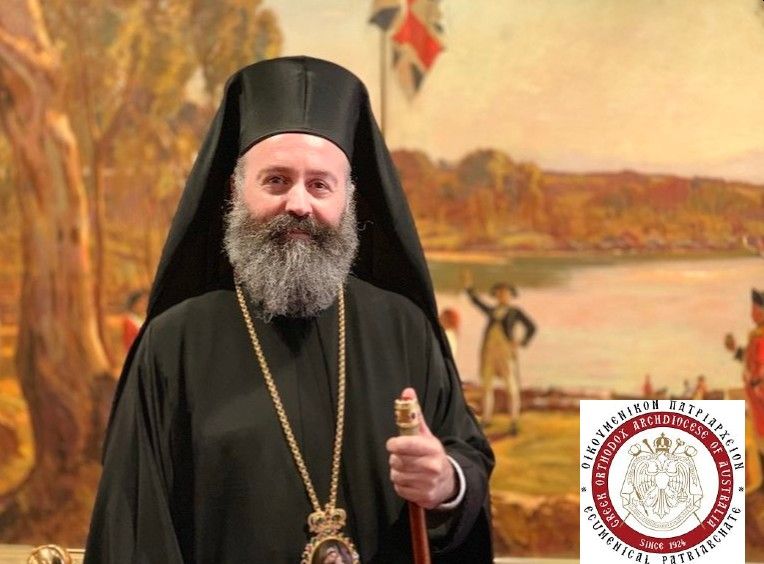
4. Do you personally, Your Excellency, fear these days? Where do you draw strength to continue your important work and how does the Archdiocese manage this unprecedented situation?
I’m not afraid at all. I feel free because I am not afraid of death. I know that sooner or later I will be called to the passage on the other side. I try in my life to fight for the people that God has entrusted to me. I’m not interested in being saved alone. I do not want personal salvation. If all my flock, the Bishops, the clergy and our people are not saved, then let me not be saved either. Paradise is society. To be in society all together. I’m not fighting in this life because I’m looking forward to winning something good in the next one. I want to increase my love for Christ every day. Only that. And when you have this goal, you are not afraid of illness, pandemics or even death. This love for Christ gives me strength and I move forward. And if you want, I suggest to everyone that they have Christ as their source of strength as well.
5. It would be a journalistic omission not to mention the mystery of Holy Communion. The Romanian Orthodox Church has for a time offered vulnerable believers the option of using a disposable plastic spoon. A decision taken due to the reactions of the faithful. What would you say to those who read this news about Holy Communion?
I personally believe the decision made by some clergy and bishops in Romania was wrong. But, you see, the feelings and criteria of the people had an impact. The people have not accepted such innovations that tarnish our tradition and faith. We, of Orthodox faith, in our historical course have no instance of anyone getting sick from Holy Communion. I, who come from Crete, know the case of Spinalonga. Spinalonga is a small island where lepers used to go for solitary confinement. The priest who served our brothers there, shared the Holy Communion with them. The paradoxical and unexplained thing is that he did not die of leprosy. He was not infected with the disease.
However, the issue of Holy Communion is a matter of faith. I cannot force anyone to believe that diseases are not transmitted by the Holy Communion, just as I cannot force anyone to believe in the afterlife or in the resurrection of the dead, which is a basic teaching of our Orthodox Church. Personally, I would have no problem communing after people who have been exposed to diseases. What is happening now with the closing of the Churches is not related to Holy Communion but to the gathering. The virus is very easily transmitted through simple communication, handshakes, etc. That is why our churches are closed. Not because I fear that the virus could be transmitted with Holy Communion.
6. It is inevitable that many people in Australia will suffer from the economic consequences of the coronavirus. Many of our compatriots may not have the money they need to provide the best care for their elderly in nursing homes, and others may not be able to pay school fees for their children. Has the Archdiocese planned any measures to alleviate the financial burden of the faithful in need?
Of course, due to the pandemic, humanity is experiencing new situations that affect the daily lives of many families. Many fell ill, some lost their jobs, some lost their salaries or were financially disadvantaged. We have to admit though that the state is showing great care for those impacted and is implementing initiatives for them. Especially in instances where people have to go to nursing homes or cases related to the education of children.
The Archdiocese is trying to look at each case that arrives at its office individually because they are not all the same. And where we can help, we certainly help. We have already helped several of our compatriots who had difficulty going to Greece. We are in constant communication and cooperation with the Greek Consulates, here in Sydney and Melbourne, and there is common coordination and coexistence.
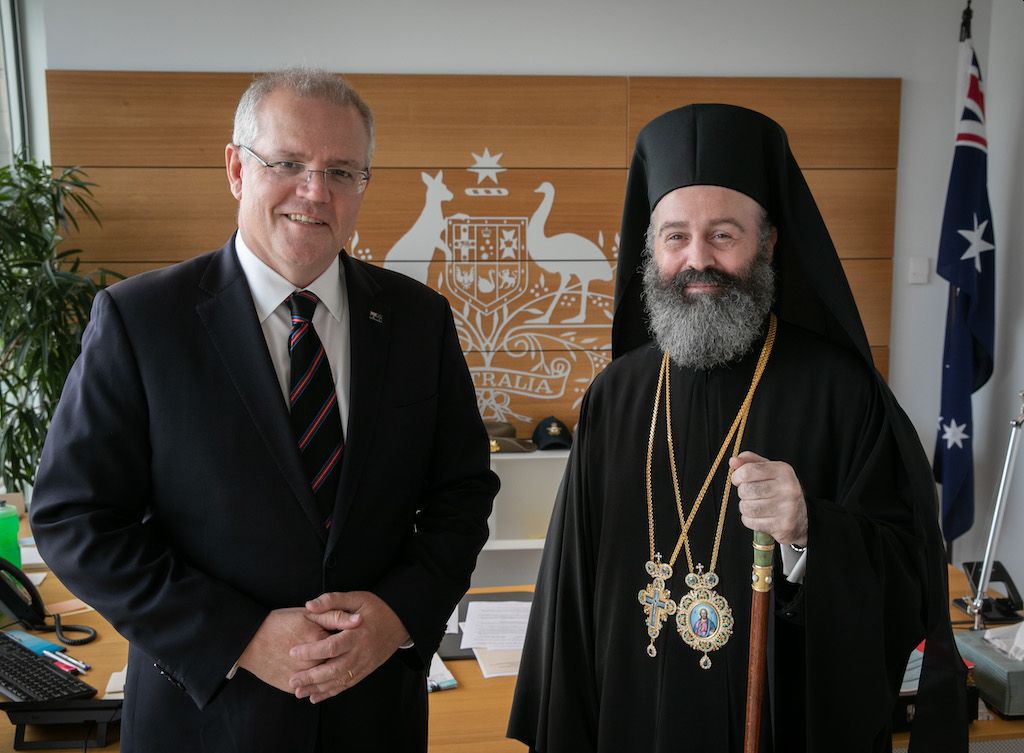
At the same time, in Melbourne, because the problem is more acute there, we started a new program for the distribution of food to those who do not have the basics and really need the help of the Church. This program also includes students from Greece. And I would like to take this opportunity to thank Very Reverend Archimandrite Evmenios Vasilopoulos, Archiepiscopal Vicar of Northcote, to whom I have entrusted this new program and is overseeing it with great success. I would also like to thank our compatriots in Melbourne and the wider region for responding and offering food and other material goods to our brothers and sisters in need.
The Archdiocese attends to them and with the help of a group of volunteers, clergy and the general population, many families and individuals are fed daily. Some of our brothers and sisters personally go to the offices of the Archdiocese and the three parishes which are collection centers and get what they need.
Meanwhile, the Archdiocese has exempted parishes from their contribution for the year 2020, as the closure of churches has dramatically reduced church revenues. We try to do the best we can. We try to give peace to every person who asks for our help. For as long as we can.
7. We would like you to give us your first impressions of your stay here, but also the view you have formed of the faithful in Australia so far. Given that we are celebrating a different Easter, what message do you want to give to your flock?
I praise God for this great blessing where I have found myself in Australia as the Archbishop of a blessed flock. It was something I had never dreamed of, nor of course had I sought it. I praise God and thank our Ecumenical Patriarch of Constantinople Bartholomew, as well as the holy Hierarchs of the Blessed and Holy Synod, for their trust and love.
Our people are very blessed. From the first moment I arrived here, they welcomed me and showed me absolute confidence and love. Our Greek community deserves a lot of praise. I’ve been in Australia for a few months now and it’s like I’ve been here for years. I now feel part of this body and every day I see God’s plan in my life. It is often revealed to me that the previous 45 years of my life have been preparing me for these moments that I live now, for our people and for this Archdiocese that I serve. With our Bishops, Clergy and Believers we have an excellent spiritual and loving communication. We are a family and the feeling of love towards me from the clergy and the people is intense and strong.
It starts with Christ. I feel that Christ unites us all. And I personally feel that I love these people uncontrollably and unlimitedly. I can’t explain it logically, how and why it happens. Every night I communicate through prayer with all the faithful. I start geographically from Perth, I go to Adelaide, I go north to Darwin, I go through Cairns, I go down to Brisbane, I go to Melbourne, Tasmania and Canberra and I end up in Sydney. Geographical boundaries help me to have all the clergy and the people in my room every night. Prayer is the means by which I communicate with my good Bishops and with the clergy and people on a daily basis.
As time goes on, I’ve started to recognise people and certain things and I try to prioritise the progress of our Archdiocese and our people. There are certainly many challenges. I do not want to say that there are no challenges, as they exist in every living organism. There are and, in fact, some of them are difficult. But all together, united and with love, we move forward and testify to the Crucified and Resurrected Jesus Christ in our modern society.
My message to readers and all other fraternal friends, near and far, is to realise that the Resurrection of Christ unites heaven and earth, the living and the dead. The pandemic may have closed our Churches and deprived us of Holy Communion, but it did not prevent us from being united in the name of Jesus Christ. The pandemic, after all, helped us understand that love is not a simple feeling, but a way of being in the world. I call on all people to have love, understanding, kindness and grace in their hearts.
